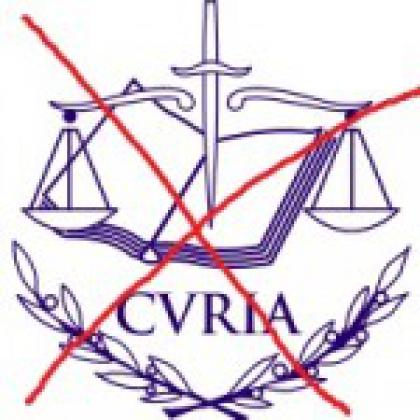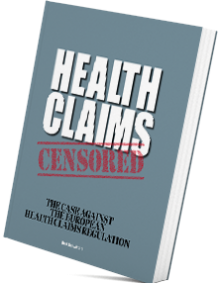9 November 2012
By Bert Schwitters
The common argument used by the defenders, promoters and beneficiaries of the Health Claims Regulation, is that the measure is very very necessary to protect consumers against false, ambiguous or misleading information. In reality, the Regulation concerns who shall protect consumers and what procedures and criteria this “who” shall apply. It is about empowering the new “who”, the European Union ,to take full control over health-related information and replace the judges of the European Court of Justice by the risk managers of the European Commission and the scientists of the European Food Safety Authority as “judges” of what does and what doesn’t constitute misleading information in the field of health and nutrition. The European Nutrition and Health Claims Regulation is the successful attempt to replace law and case law by political and “scientific” power.
Lest we forget, European consumers have been and still are solidly protected by law against false, ambiguous or misleading information, i.e. by various detailed European regulations, in particular by Directive 2005/19/EC concerning unfair business-to-consumer practices. This Directive unequivocally and comprehensively defines a commercial practice as misleading, …
“… if it contains false information and is therefore untruthful or in any way, including overall presentation, deceives or is likely to deceive the average consumer, even if the information is factually correct, …”
“… if, in its factual context, … , it omits material information that the average consumer needs, according to the context, to take an informed transactional decision …”
“… when, …, a trader hides or provides in an unclear, unintelligible, ambiguous or untimely manner such material information … or fails to identify the commercial intent of the commercial practice if not already apparent from the context, …”
… and thereby causes or is likely to cause the average consumer to take a transactional decision that he would not have taken otherwise.
Placing the Claims Regulation in the long-standing tradition of consumer protection law, and so misleadingly giving the Regulation the appearance of a measure that concerns or relates to law, case law and courts, the “good old” legal concept of consumer protection is laid down in Article 3a, which provides that “the use of nutrition and health claims shall not be false, ambiguous or misleading.” Without the slightest explication or argumentation, the legislators then unhook the Regulation from the legal concept of consumer protection and reframe it as a scientific one. In Article 6.1, a misleading practice is redefined as one that hasn’t been verified as substantiated by “generally accepted scientific evidence” and that isn’t based on a convincingly shown “cause and effect relationship.”
Forget “old hat” terms such as false, ambiguous or misleading. In the world of Union-controlled speech, the definition of “misleading” is now “what cannot be convincingly proven by applying scientific methods of the highest possible standard.” Judgment regarding the practice of using health claims in commercial communication now involves scientists, scientific textbooks, scientific evidence, scientific methods, scientific “authorities” and “panels,” scientific “consensus,” “randomized controlled clinical trials” and risk-managed authorisation procedures.
Thus, in the Health Regulation, EU legislators completely removed consumer protection from the realm of consumer protection laws and the competence of the courts, more in particular of the European Court of Justice. They placed it under the political control of the European Commission’s risk managers, who, taking into account the scientific opinions of the European Food Safety Authority (EFSA), are now empowered to “scientifically” authorize or reject messages and/or representations informing consumers about the relationship between a food and health.
This “scientistic”[1] construct completely robs consumers of their right to seek legal redress against the European Union. A decision made by the EU – to “scientifically” authorize or reject a health claim - that causes or is likely to cause the average consumer to take a transactional decision that he would not have taken otherwise, cannot be challenged before the courts since the courts do not adjudicate conflicts concerning scientific evaluations. This is particularly relevant in case a rejection of a health claim would be legally misleading if, in its factual context, the rejection would lead to the enforced omission (hiding) of material information that the average consumer needs, according to the context, to take an informed transactional decision …”
Example. The enforced and deliberate omission (rejection) of the health claim that cranberry juice is probably beneficial for the urinary tract, may cause or likely cause the average consumer to take a transactional decision that he/she would not have taken otherwise. By hiding this legally non-misleadinginformation, consumers are unwittingly coerced to go and get a prescription for antibiotics.
Another example. The enforced and deliberate omission (rejection) of the health claim that antioxidants may delay or prohibit the onset of degenerative diseases, may cause or likely cause the average consumer to take a transactional decision that he/she would not have taken otherwise. By hiding this legally non-misleading information, consumers are silently coerced to eventually consult medical doctors and use a plethora of expensive medicinal products and medical devices applied by doctors in cases of cancer and cardiovascular and autoimmune diseases, to name the most prominent degenerative conditions plaguing European consumers.
The Nutrition and Health Claims Regulation’s genuine goal is not to protect consumers against misleading information, but to silently coerce them to take transactional decisions they might not have taken otherwise. In this regard, the Claims Regulation is a misleading public practice that violates well-established consumer protection laws.
[1] Scientism is the belief that only science can produce knowledge and that knowledge not produced by science is illusionary. Scientism thus destroys tacit, traditional and spiritual knowledge.




